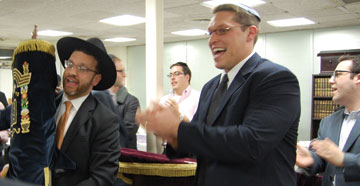 When Hurricane Sandy’s floodwaters immersed the Five Towns of Nassau County, they rose four feet high in the sanctuary of Congregation Ahavas Yisroel and soaked the four Torahs in the synagogue’s Aron Ha-Kodesh (ark) making them posul — not kosher. A synagogue without usable Torahs is like a school without teachers. Something had to be done.
When Hurricane Sandy’s floodwaters immersed the Five Towns of Nassau County, they rose four feet high in the sanctuary of Congregation Ahavas Yisroel and soaked the four Torahs in the synagogue’s Aron Ha-Kodesh (ark) making them posul — not kosher. A synagogue without usable Torahs is like a school without teachers. Something had to be done.
Meanwhile, hundreds of miles away here in Overland Park, Kehilath Israel Synagogue’s Rabbi Shmuly Yanklowitz meditated on the fact that for over a century his synagogue has built up a storehouse of 15 Torahs. Realizing that his shul had many more Torahs than it needed while other synagogues were now bereft, he turned to the Orthodox Union to help him find a synagogue that needed a spiritual uplift by receiving a Torah — permanently, and not as a loan.
As he explained while delivering the Torah in New York, Rabbi Yanklowitz said, “When you hear a cry from k’lal Yisroel and you ignore it, it leaves a void.”
“If a Torah sits in the aron and others need it, you must act. When we saw how many Sefer Torahs our shul had, I asked myself, ‘Who owns these Torahs?’At the end of the day, HaKodesh Baruch Hu owns everything. Nothing in a certain sense is truly our own. We can’t own a Torah in the deepest sense. We all own something that someone else needs.”
“Tonight,” he summed up, “we are celebrating the power of Torah.”
Rabbi Yanklowitz and his wife, Shoshana, personally delivered the Torah to its new congregation, flying it in from Kansas City to Newark, with a stop in St. Louis. That journey reflected Jewish life in America; and, much to their delight, Southwest Airlines provided a special compartment for the Torah so that it could journey comfortably to its new home.
“Walking in the airport in Kansas carrying the Torah wrapped in a tallit (prayer shawl), people looked at us like we were aliens,” Rabbi Yanklowitz related. “In St. Louis, maybe one or two people knew what it was. In Newark, everyone was kissing the Torah and dancing.”
An interesting side note to this is that neither of the two synagogues are Orthodox Union member congregations. To the OU it didn’t matter.
“They are doing good works,” OU President Dr. Simcha Katz declared. “That’s all that mattered.”
The celebration at the shul took on the atmosphere of a Simchat Torah service with vigorous dancing with the new Torah and the two loaners the shul had previously received.
“We’re getting this Torah because we lost ours,” said Rabbi Yissachar Blinder, the young spiritual leader of the synagogue. “Some of our families are not home yet. So that’s bitter. It hurts. But it is so sweet that a shul in Kansas City reaches out and shares something it has and that someone else needs and gives it to those who need it.”


